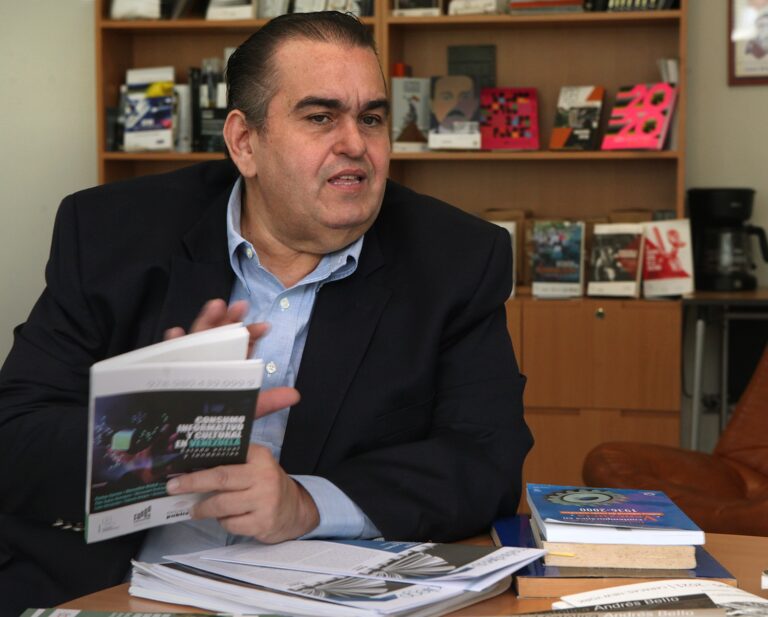The Instituto Prensa y Sociedad de Venezuela (IPYS-Venezuela) recorded various incidents involving journalists reporting on the municipal elections that took place in Venezuela on December 8, 2013.
The following is a roundup of information from Instituto Prensa y Sociedad de Venezuela (IPYS-Venezuela) about incidents involving journalists reporting on the municipal elections that took place in Venezuela on December 8, 2013:
On December 5, 2013, an official of the National Elections Council, the regulatory body for election processes in the country, prevented Carlos Eduardo Sánchez, journalist and correspondent for NTN24, an international news channel based in Bogotá, and his crew from entering a hotel in the city of Caracas, because they were not carrying identification as journalists. This took place as the reporters attempted to cover an event related to the municipal elections scheduled nationwide for December 8, 2013.
Carlos Eduardo Sánchez told IPYS-Venezuela that he was outside a hotel in the capital city, where they hoped to shoot a special coverage for the TV station on the municipal elections, when he saw that representatives of an observers’ committee of the Union of South American Nations (UNASUR) were about to enter through the hotel’s main entrance.
Sánchez approached the committee with no camera or microphone, with the intention of talking with one of the representatives, who gave him a UNASUR press telephone contact number. At the same time, two men identified as security staff for the elections council ordered the reporter to leave the premises.
The reporter stated that he got upset and angry with the hotel security staff, who ignored him when he identified himself clearly as a journalist, alleging that he was only having a chat with a committee member. Idania Chirinos, news director for NTN24, then approached the hotel with cameraman Ronald Alexander Pérez and Jaime Pijaro, a photojournalist sent especially from Bogotá, Colombia, to offer support to the reporter.
While another security staff member attempted to cover the video camera lens with his hand, a woman who identified herself as only an elections council official intervened in the discussion and prevented the crew from entering and doing any work on the municipal elections.
Sánchez said that the press crew was waiting for their credentials, since the elections council had not sent them to the TV station beforehand. He also stated that when the crew was walking towards the hotel parking lot, nine National Bolivarian Police officers arrived on motorcycles. Although the reporters left the premises, Sánchez said he thought that the agents were there to intimidate them.
In a separate event on December 8, officials of the Plan República, a military force in charge of safeguarding national security during election processes, prevented journalist Mariangel Moro Colmenarez and photojournalist Johana Hernández, who work for the privately-owned Última Hora newspaper based in Acarigua, Portuguesa state, from covering events at some education centers which had been set up as voting centers for the municipal elections.
Moro Colmenares told IPYS-Venezuela that in Felicia Baéz state school and Oscar Picón Giacopini national education unit, located in San Rafael de Onoto and Agua Blanca municipalities, the men in uniform told them that, as per orders from above, the press was not allowed to enter the institutions even though they were both wearing press accreditations issued by the National Elections Council.
Also on December 8, journalist Maryné Glod, who works for the national TV channel Televen as a correspondent in Táchira state, told IPYS-Venezuela that officials from the National Elections Council and the Plan República used National Bolivarian Armed Force officials to guarantee security during elections, and prevented her from fulfilling her duties as a reporter.
Glod stated that in the afternoon she arrived at the voting center at Leonardo Ruiz Pineda School. There, a large number of persons were waiting close to four hours for a problem with one of the voting machines to be fixed in order to be able to vote.
An official with the elections council told her “record this so that the people can see that people are voting”. Afterwards, an officer of the Plan República prevented the Televen cameraman from taping what was going on. The journalist told the official that she had originally been urged to film what was going on.
Another woman with the council yelled at the journalist and told her “You cannot record anything in here and if you do, you and Televen will be sued”.


